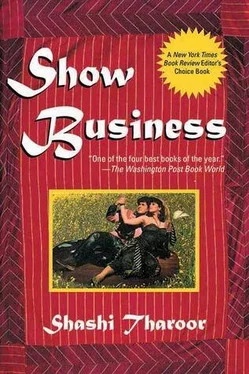So one thing led to another and when my brother came down to India you sat with him and asked earnest questions about Swiss bank accounts. At least so he told me, I wasn’t even there, but I don’t see why he would lie. So Nadeem said, “Sure I have a Swiss bank account, many of us in the trading business have to, and I can help you open one.” And he took a lot of trouble too, explaining how it could be in any name or number, and you thought of using your birth date as the number and Nadeem explained how easily that could be traced back to you, and finally you settled on Gypsy as a translation of Banjara. Remember how you forced poor Choubey to switch a whole sequence from Kashmir to Switzerland in that film, Himalay ke Peeche, so that you could tie this up in Geneva yourself?
I didn’t mind, because it meant boating on the Lake of Geneva with you, the Alps rising white and majestic behind like the cover on a box of chocolates, and letting the spray from the Jet d’Eau blow onto our new parkas as we laughed at the absurdity of the Swiss manufacturing a tourist attraction in the midst of all this natural splendor. And how you chased me into St. Pierre’s Cathedral, saying you wanted to make love to me in a confessional, and the look on your face when you discovered it was a Protestant church and they either didn’t sin or wouldn’t confess to it! And your shock on discovering that the casino wouldn’t permit bets above ten francs and that a box of chocolates cost twice that much. And the Piaget watch you bought me, even though I told you I never wanted to know the time, never wanted to see it passing when I was with you. And how I dragged you off to the hotel where Professor Calculus had stayed in my favourite Tintin adventure, and you said stuffily, “Is that all you read, comic books?” but you still photographed me near that life-size cutout of Tintin they had in the hotel lobby. Are you amazed at how much I remember? But what I remember most of all about that visit to Geneva was how disbelieving you were that you could walk anywhere without being instantly mobbed and asked for autographs — and the tone of regret in which you said, “It must be this parka, I could be any cold tourist.” Oh, Ashokji, how much I loved you then, and how much I love you now.
My Guru says I must stop looking back. The past is always there with me anyway, he says; what I am is the result of the past as it shapes itself into the future, which in turn immediately becomes the past. The present, he says, is an illusion: each moment has either already happened or has not yet happened, it is either past or future. The problem with Westerners, he says, is their obsession with the present, which means they are living for something that does not exist. Does that make any sense to you? It didn’t entirely to me, but the Guru is obviously a great man and I cannot always expect to understand everything he says.
I’ll tell you something that he should have said to you when you were getting mixed up in all those Swiss bank accounts. It’s something he said to me when he was explaining why I should renounce my worldly goods to his ashram. “In our legends and our shastras,” he explained, “there has always been a conflict between Lakshmi and Sarasvati, that is, between the goddess of wealth and the goddess of the arts. In other words, my dear, wealth and art are not compatible: one constantly destroys the other. It is better, in the natural order of things, for the wealthy to have no taste, and for the artistic to have no wealth.” If you had only realized that, Ashokji, you wouldn’t have got into that whole mess.
But you didn’t really do too badly, did you? I mean, considering. After all, you’re not in jail or anything. How you got it so screwed up I don’t know. It was a simple enough arrangement. Whenever my brother and his associates needed money here, they got it from you, and Swiss francs went into your account — for your family holidays abroad and Maya’s selfish little shopping trips to Harrod’s. No one asked any questions and no one need have, if you hadn’t gone and got mixed up in politics. Now who asked you to do that? That dried-up little minx of yours wanted to be a minister’s wife, I bet. I mean, what else could she be after Dil Ek Qila, hanh? I wouldn’t have been able to show my face to a producer after that disaster, let alone to a camera. But she gave you more guilt by “sacrificing” her career again, as if she had any career left to sacrifice. Great comeback that was. More a go-away than a come-back, if you ask me.
I was very angry with you then, Ashokji, and with the way you just stopped seeing me. But Guruji counseled me again, quoting Manu this time — you know, the ancient lawgiver. From time immemorial women have had different roles at different times. The same woman who is treated as a chattel in domestic matters is an essential and equal partner in rituals, religious sacrifices, the offering of homage to ancestors. An Indian woman’s consolation, the Guru said, is that she knows where she is irreplaceable, in what she is indispensable, and when she is irrelevant. And that applies not just to me, but to that minx Maya as well.
Who’s that? What…?
Oh, it’s you. Hello. What do you mean what am I doing here? I’m visiting our husband.
OK, baba, don’t scream, I’m going now. All right, all right, there’s no need to make a fuss. I was going anyway. Oh, and I suppose you should know, for the doctor, that I didn’t get a peep out of him. But then I couldn’t see the part of him that usually responds to my presence.
Have a nice day, Mrs. Banjara.

Interior: Day
I can’t believe I’m doing this.
Me, Ashok Banjara, product of the finest public school in independent India, winner of its English Elocution Prize, best-dressed undergraduate at St. Francis’ College, drinker of eighteen-year-old Macallan, standing up on a rickety platform in churidar and kurta, declaiming the virtues of the Prime Minister’s party in chaste Hindi to a rural throng that look like they couldn’t even afford the proverbial twenty-five paise for their cinema seats. But it is me, it’s my mouth that’s moving in political recitation, it’s my arms that are gesticulating under the shawl that’s draped toga-style over my khadi kurta, it’s my voice calling for social justice, rural development, and votes. Me, Ashok Banjara, political campaigner and aspiring member of Parliament. Now there’s an unlikely turnabout. I carefully enunciate the idiomatic muhavrein that a Bollywood lyricist has scripted for me, I fling my right hand skyward and pause for acclaim; and as the acclaim comes, I tell myself, you can’t be serious, old son — or can you?
It’s all happened so suddenly. OK, I can’t pretend the thought hadn’t entirely occurred to me. After all, it’s in my genes. I am my father’s son, even if I’ve tried to deny it all my life. And I’ve never really been able to shake off the underlying desire (again, repeatedly denied) to win his approval. I couldn’t at school, in my choice of job, in my plunge into films; I could, and did, when I picked a wife. Somewhere at the back of my mind lay the thought that I might one day do something that would make him truly proud of me. And politics was the only possibility: it was his world, he’d always wanted me to join him, I’d refused — and now I confronted the wonderful paradox that my nonpolitical fame had actually improved my prospects of being able to enter his world successfully.
Читать дальше













